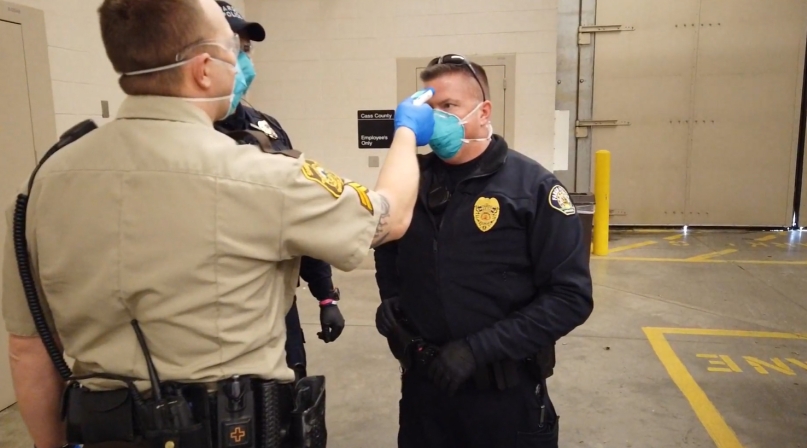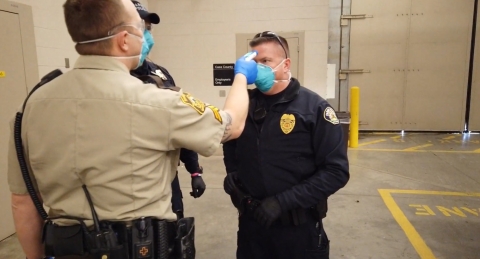Faces on the front lines: Cass County Sheriff Jesse Jahner
Author
Upcoming Events
Related News

A global pandemic doesn’t stop the need for county services across the country, including law enforcement.
As sheriff of Cass County, the most populous county in North Dakota, Jesse Jahner is a face on the frontline leading both the sheriff’s office and correctional facility during a situation that was hard to predict when he was elected.
For Jahner, one of 3,000 sheriffs in counties throughout the country, the coronavirus pandemic has complicated his job, changing his day-to-day routine and the way he operates to serve the community. Here’s a look at how COVID-19 has changed his days on the job:
Mornings
To prepare for his day, Jahner’s first task in the morning is the same as his pre-pandemic routine. He checks his email to review calls and reports made by his patrol staff from the night before.
“That’s my first course of business,” he said.
Jahner also spends his mornings reviewing information from the Cass County Jail, which he described as the “backbone” for the county’s criminal justice system.
This is where his morning slightly differs from six months ago. He reviews how many individuals have been booked into the facility as well as information on potentially symptomatic inmates.
“If we do get the virus inside our [jail] walls, that could cause us to shut the doors and of course we don’t want to do that because then we can’t provide that safety piece to the public,” he said.
Throughout the morning and even during the day, Jahner consistently checks with his jail staff to ensure the facility is running normally, has capacity and is following protocols and procedures that he set in place to protect inmates from COVID-19.
Afternoons
As his day continues, Jahner attends a daily command staff briefing held each afternoon to ensure his office is properly responding to the fluid situation with the virus as more information from the Cass County Health Department and the CDC becomes available.
“As we get new information every day, we’re constantly adjusting our procedures and making sure that we’re staying up with that current information,” he said.
From Jahner’s perspective, the virus has altered the daily operations at the sheriff’s office from two perspectives: The field side and the corrections side.
Jahner oversees many precautions on the field side, which includes the patrol division, investigative division, street crimes division and narcotics division.
The coronavirus has proved challenging when it comes to field operations, he said, with officers following social distancing guidelines and trying not to become exposed or expose members of the community to the virus.
“It’s been somewhat of a struggle for us because at the sheriff’s office, we really want to be proactive and really want to be involved in our community activities,” he said.
Jahner also enforces additional precautions for his staff, which include taking their temperatures daily, completing a questionnaire which asks about COVID-19 symptoms and wearing personal protective equipment such as N-95 respiratory masks, eye protection, rubber gloves and gowns when necessary.
“We are just constantly monitoring and making sure we’re being vigilant in monitoring people’s physical conditions and then monitoring how we’re interacting with the public,” he said.
On the correctional side, which involves the Cass County Jail, additional precautions begin at the intake process. Jahner instructs officers, who are wearing personal protective equipment, to scan the temperatures of individuals entering the facility and ask them questions about coronavirus symptoms before moving them to an isolation pod.
Medical staff monitor inmates for several days before they are moved to the general population and if it is suspected someone may have the virus, they are tested at a local medical center.
Evenings
With every day bringing different challenges, Jahner said he may work his regular hours one day and may not return home until 10 p.m. or 11 p.m. the next day.
“It really just varies,” he said. “It’s not a consistent schedule by any means.”
Depending on what happened throughout his day, Jahner takes extra precautions when returning home or back to the office, specifically after visiting the jail.
“I’m leaving that facility going straight home and making sure that I don’t interact with people or expose other people to what I have been exposed to that day,” he said.
Before the pandemic hit, Jahner was making his rounds visiting a new community every week to meet with citizens, eventually hoping to rotate throughout every community in Cass County.
“That’s been very restrictive now and that’s been hard for me because going out and interacting with our public, talking on a regular basis is really how we adapt and really how we gauge our law enforcement presence,” he said. “Not having that interaction every week has been a little bit challenging for me. It’s been hard. It’s something that I really miss right now.”
At the end of each day, Jahner said he reviews what areas his office can improve on to keep Cass County citizens safe.
“I just really want to relay the message that although the pandemic is going on,” he said, “we are still very much there for our citizens and public safety is going to be the number one priority in anything we do.”
NACo’s We Are Counties Campaign puts faces on the frontline services counties provide. For more information, visit naco.org/wearecounties.

Attachments
Related News

County officials moonlight in search and rescue roles
For some county officials, participating in search and rescue operations is another way to serve their communities, and make it safer for people to enjoy natural recreation resources.

SUPPORT Reauthorization Act of 2025: What it means for counties
On December 1, the bipartisan SUPPORT for Patients and Communities (SUPPORT) Reauthorization Act of 2025 (H.R. 2483) was signed into law. The reauthorization renews vital federal funding for programs that seek to prevent opioid overdoses and expand treatment and recovery options.

DHS releases FY 2026 funding opportunities for World Cup and Counter-UAS grants
The U.S. Department of Homeland Security (DHS) and the Federal Emergency Management Agency (FEMA) have released the FY 2026 Notices of Funding Opportunity (NOFOs) for two major new homeland security grant programs: the FIFA World Cup Grant Program and the Counter-Unmanned Aircraft Systems (C-UAS) Grant Program.
